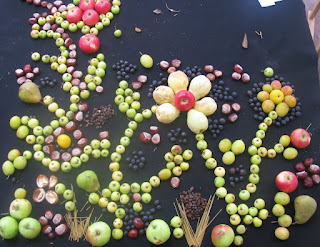 |
| The 'perfect' teacher |
It's the morning of the second day at school, and the excitement of meeting old friends is over. The holidays are over. It's back to work.
Arthur (our 8yr old) is awake early and we start talking about school:
'So what did you do yesterday?'
'We wrote about our holidays. We always write about our holidays. It's so boring.'
There's still a while to go before school, so we have a chat about it. I can see the teachers will want to find out a bit about the children they will be working with, and that the most recent bit, their holidays, is probably a good place to start. I put this to Arthur. He agrees:
'But why do we have to write about it?'
On this, I think, he has a good point. Writing is obviously a key skill children will learn in school, but it's not the most natural way your average 5, 6, 7, 8 yr old will express themselves. If the teacher's objective is to find out more about a child, then I'm pretty sure most essays about 'what I did in the holiday' will tell you very little. Except possibly how good at writing a child is.
It reminded me of Arthur's first meeting with his new teacher last term, where they were all warned, ''If you give me grief, then I'll give you grief, if you give me joy, then I won't give you grief...you'll get to like me." The teacher very much setting out relationship boundaries.
Arthur goes on to tell me more about his first day. At assembly they set 'ground rules, and reviewed the '10 Golden Rules'. He got a star, for remembering one. He remembered (and I was proud of him) that you've 'got to respect your teacher and the other children'. The rules he remembered all were important.
I understand why so many teachers start with 'the rules', but how is reviewing the rules appreciating the wider objectives of education (developing confidence, ability for deep learning, reflection...) or indeed, the most immediate challenge to develop good relationships with the new children and their parents? I know what my response to what appears to be a lecture on 'ground rules' would be. As a parent with a mixed experience of school it does re-enforce all my poorer experiences and, I find myself quickly falling into the cynical trap of seeing school as a problem, something to be endured, and have to resist putting this across to Arthur
This is all my perspective, as a parent. I'm also aware Arthur may say a very different thing about school tomorrow. Also that the teacher may be overcoming insecurities about their children and their relationship with children and parents, and things will get better as the year continues. The school Arthur goes to is a good school. He is very happy there, and throughout the last four years there have been many creative projects and topics which have engaged Arthur, in which he has expressed himself, reflected and learned. I am sure soon we will think as highly of Arthur's new teacher as we (parents and children) do of his previous teachers. The sort of open-ended projects, where children bring things (or people) into school, use of film, artwork, photographs to document and to provoke conversations - anything, that might be seen firstly as fun, and can develop a richer understanding of the children, their parents, their lives, will help the teacher find out more and to initiate more positive relationships.
It is interesting to see which teachers Arthur likes and respects, and why. Without a doubt, those teachers that are seen as 'fun' are the 'best'. 'Fun' to Arthur, turns out to be enjoying learning with the children - the teacher who plays Ukele, is prepared to laugh at themselves, plays with the children, dances to Abba, who gets into the swimming pool with the children, is prepared to admit they don't know it all, wants to learn with the children, taking risks with them.
The teacher's role is not the same as a best friend, and I'm not suggesting all teachers should learn the Ukele (although would be fun), but that the best way to secure an effective learning environment, the starting point for any teaching, must be to develop good relationships with children and parents.
Useful links:













